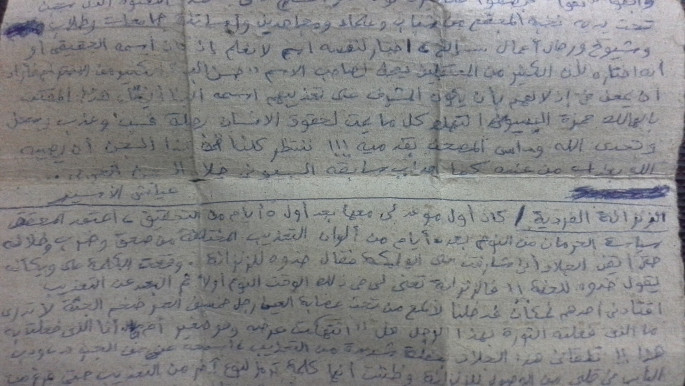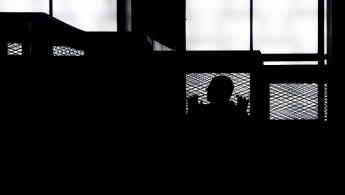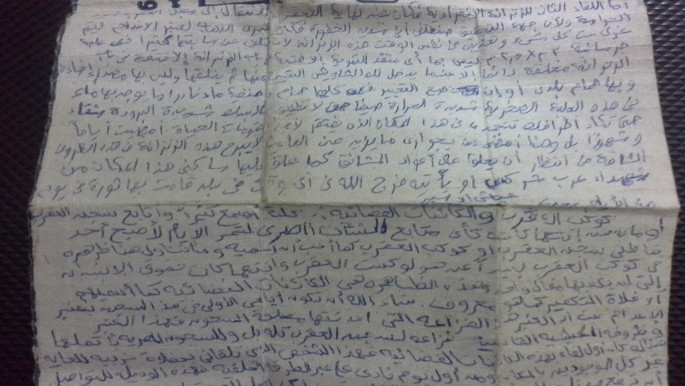Exclusive: Letter from Egypt's notorious 'Scorpion Prison'
The letter, signed by pseudonym 'Ayash al-Assir' [Ayash the captive], was written on cardboard. The detainees are not allowed access to paper and writing material.
The first part of the letter opens with a vow in the name of pre-Islamic Gods of Arabia, apparently used by the chief guard at the prison, to provoke Islamist prisoners.
Al-Assir describes him as a "vile Panda", in reference to his size, who is in his thirties. "The government and prison service have deliberately appointed him to torment the prisoners at Scorpion. He can always be heard saying: 'I am immortal. Pray to God maybe he will help, but spit on my grave if you ever get out again.'"
The chief guard/tormentor "controls the fate of the prime of our youths, scholars, professors, students, clerics and businessmen." "He has chosen for himself the nickname Hassan al-Banna," the founder of the Muslim Brotherhood, the letter said, claiming that the man has repeatedly insulted the prisoners' religious sentiments by desecrating the Quran, as well as torturing and abusing them.
| Twitter Post |
Solitary confinement
"I was placed in a solitary cell five days after being first questioned. The interrogators deprived me of sleep after days of various torture. When it seemed I was nearly going to die, they put me in the cell."
"The cell meant for me sleep and being spared from torture at the time. But I was taken to be tortured again by this huge man in his fifties. After he finished beating me up, he called on the guards to take me to the 'hotel'".

"I was then taken to a dark cell. All I could hear there were the barking of hounds and sounds of prisoners being tortured. But I didn't care. I lay on the ground and fell into deep sleep. When I woke up, I found myself in a room about 1.4 meters wide and 1.4 meters long."
Assir wrote that the were no sources of light in the room except for a small barred window at the top. "I found a bottle with a liquid. I wanted to perform ablution but I found out the bottle was for urinating."
The prisoner was then taken for a new round of torture, as he said.
On another occasion, he was taken to a different solitary cell. "After being designated as extremely dangerous by the interrogators, I was placed on death row, where I was isolated and tortured at the same time.
"The other cell was not that different...there was no ventilation or lighting. It had a pit in the ground and a faucet that rarely had running water."
"The concrete room was very hot in the summer and very cold in the winter. I spent days and months in this place devoid of the most basic necessities of life. Others spent years waiting to be hanged."
 |
Conditions in Egyptian prisons have been largely under scrutiny by local and international human rights organisations. |  |
Conditions in Egyptian prisons have been largely under scrutiny by local and international human rights organisations.
In its 2015/16 annual report, Amnesty International described conditions in Egyptian detention facilities and police stations as "extremely poor".
"Cells were severely overcrowded and unhygienic, and in some cases officials prevented families and lawyers giving food, medicine and other items to prisoners," the report said.
Egyptian security authorities have also been blamed for torturing prisoners, sometimes to death.
In an earlier report, Amnesty International said that torture and other ill-treatment of criminal suspects were "routinely used to extract confessions and punish and humiliate suspects", reportedly leading to several deaths of detainees.
"Commonly reported methods of torture included electric shocks to the genitals and other sensitive areas, beating, suspension by the limbs while handcuffed from behind, stress positions, beatings and rape," the report added.
"Deaths in detention were reported, with some apparently attributable to torture or other ill-treatment or inadequate conditions in police stations."
Twitter Post
|
However, torture allegations have been repeatedly denied by state-run rights organisations.
In August 2015, Mohamed Fayek, the president of the Egyptian National Council for Human Rights (NCHR),announced that all Egyptian prisons were "completely free of systematic torture".
"But the fact that systematic torture has ended does not mean that there is no torture at all," he said.
"It can still happen. After all, we are human," he added, emphasising the council's right to visit prisons.
"We will continue to visit prisons to ensure the elimination of torture, a crime that had been endemic here for a long time."
Known as Egypt's most notorious detention facility, Scorpion prison is a maximum-security facility. Located in Torah prison complex on the outskirts of Cairo is has been used to detain political prisoners.
The construction of the prison, which was opened in 1993, was supervised by Mubarak-era interior minister Habib al-Adly, and based on US high security facilities.
It was also used in the US abduction and torture programme of the last decade.




